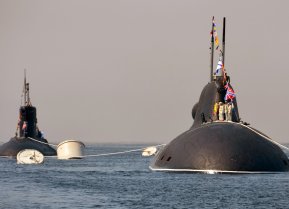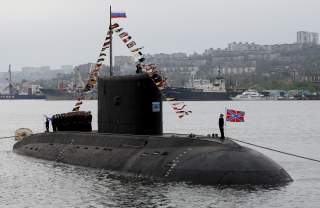Russia's Submarine Force Is Getting Stronger. How Worried Should We Be?
Moscow's moves toward submarine modernization are absolutely cause for attention but are hardly unanswerable leaps forward which Western nations are powerless to thwart.
Skeptics of Russian submarine modernization note that unless they fully meet their most optimistic goals for shipbuilding and capability development, the Russian Navy will not be able to maintain fleet numbers as many boats are reaching the end of their service life. Approximately 75 percent of all submarines currently in service are over twenty years old. It is certainly true that Russia has set a high level of ambition given their capabilities and present challenges. A desire to focus on domestic spending and poor oil sales have forced cuts in the Russian defense budget and a commensurate downward revision of both the number and type of new surface ships included in the overall modernization program. That said, Russia need not field a massive submarine fleet to achieve its limited goals. Russia’s government has not indicated that it lacks an understanding of its own limitations, resorting to strong language and military restraint when faced with the loss of a plane to Turkish interceptors, coalition strikes in Syria, and the United States’ abandonment of the nuclear deal with Iran. Between newly produced ballistic missile submarines and existing submarines scheduled for upgrades, even a fraction of the remaining Borei-A orders would be a sufficient nuclear deterrent to meet their needs. The Krasnodar’s strike and, if true, reports regarding the interception of a British submarine during the 2018 strikes in Syria speak to the capability of even old Russian subs to threaten NATO forces in likely operating environments. Additionally, the degradation of NATO ASW capability means that what subs are produced will face a more permissive operating environment than in previous years, at least in the near-term.
While building a strong fleet is not an insurmountable challenge for Russia, it is important not to overstate the threat posed by their actions. As a group, NATO’s members still maintain and are seeking to recapitalize their submarine, surface, and land-based antisubmarine forces. While these combined forces are a shadow of what they once were during the Cold War, enormous investment would be required to build enough submarines to establish overwhelming superiority over the alliance’s naval power. Recent decreases in the Russian defense budget would limit Russia’s ability to pursue any overall superiority. Though the Russians have demonstrated a willingness to privilege their undersea fleet over their surface fleet in recent budget cuts, they have not sought to make submarines an overriding priority at the expense of other domestic and military programs. To the extent that Russian activities create a permissive environment for continued Western sanctions, or that market forces hamper Russian revenue collection, it is likely that future cuts will continue to limit their naval shipbuilding ambitions. Russia’s moves toward submarine modernization are absolutely cause for attention but are hardly unanswerable leaps forward which Western nations are powerless to thwart.
Justin Mohn is a writer based in Kansas City whose work has appeared in The Center for Insurance Policy and Research. Justin previously worked in NATO's Defence Investment Division, and received his Master's in Security Studies in 2017 from Kansas State University.
Image: The crew of the Varshavyanka class diesel submarine take part at the Victory Day parade in Vladivostok, Russia, May 9, 2015. Russia marks the 70th anniversary of the end of World War Two in Europe on Saturday with a military parade, showcasing new military hardware at a time when relations with the West have hit lows not seen since the Cold War. REUTERS/Host Photo Agency/RIA Novosti


